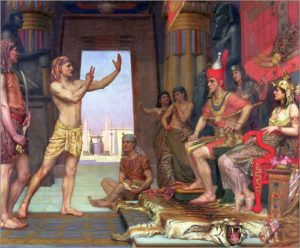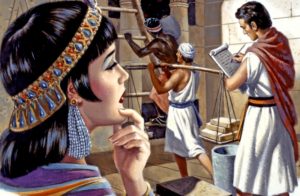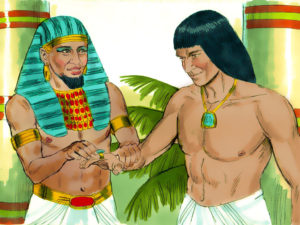Miketz – Shabbis Chanukah 2016: The Miracle of Chanukah in Modern Terminology
by devadmin | December 29, 2016 8:47 pm
Siman Tov U’mazel Tov…..we begin this Shabbis Chanukah edition with big mazel tov wishes to our close friends Carole and Shlomie Blisko upon the wedding -going on right now, mamish- of their amazing son Zach, to Jordanna Abikzer, she the beautiful daughter of Susan and Avi Abikzer. Mazel tov to the entire extended Blisko, Eisenberg and Abikzer families. May Jordanna and Zach be blessed to enjoy many decades of blissful marriage and to give their respective parents many grandchildren. Omen!
Mazel Tov and happy anniversary wishes are extended to Oisvorfer followers and friends, Dena and Ben Isaacs, who celebrated their 18th earlier this week on December 27th. Chazak!
Raboyseyee and Ladies
The Miracle of Chanukah in Modern Terminology.
A random thought or two before we begin.
Though the Yiddin have enjoyed the use of a fixed calendar since somewhere in the 4th century and know precisely when Rosh Choidesh falls each month, and as a result, there are no longer any questions about when any Yom Tov begins and should end, a ruling seemingly enacted by either some fellow Reb Gamliel or perhaps by Hillel Hanosi (back then) and confirmed some 1700 years ago by the Sages whose discussions and decisions made their way into the heylige Gemora (Beitza: 4b), dictates that we Yiddin living in golus (the Diaspora) need to continue the observance of two days of Yom Tov while our brothers and sisters living over in Israel may observe but one day only. That was one very long sentence. Shoin! We refer to this second day as the “yom tov shaynee shel goliyous” (the second day of Yom Tov of the Diaspora.) And while Yiddin have been complaining bitterly about having to observe this second day, and have gone to great lengths -including buying land, an apartment(s), or a house, over in Israel- in order to qualify for the one-day exemption loophole -isn’t that what it is- here in the United States, we cannot shake free of their decree. A few have written the heylige Oisvorfer begging that he break new ground and enact a new ruling. Someone should! Ober, what has all that to do with either this week’s parsha or Chanukah, or Shabbis Chanukah which will be celebrated this coming Shabbis following the observance of Roish Choidesh which began a few hours ago? Let’s find out.
The goyim, as has been the case throughout history, have been jealous of the Yiddin and their two day holiday celebrations. Most of their important days are observed but on one day. Ober, why should we Yiddin, they wonder, enjoy a second day off from work, while they are obligated to show? Why shouldn’t they have a second day of Yom Tov? And taka why not? Nu, after having, over the generations, stolen kimat all of our holidays and incorporating them -in one form or another into their own- along came President Obama and declared that one day of Christmas wasn’t enough. Mistama you know that on Christmas, a few of the umois ho’oilom, specifically the Christians, and all that later broke away from strict Christianity, celebrate the birthday of Jesus. Ober, was he born that day? Efsher we taka don’t know when Jesus was born.
 Efsher he was born ‘bein hashmoshis (twilight), efsher it was closer to, or just past ‘shkias hachamo (sunset),’ ver veyst? And taka the goyim don’t know. And why not? Seemingly his birthday is not recorded anywhere in their Bible (New Testament.) Seemingly it’s derived -lihavdil- medrashically, and it stuck. Does anyone know with certainty? Seemingly not! What to do? Shoin, efsher borrowing a page from Hillel and the heylige Gemora who solved the not-knowing precisely when Roish Choidesh began (back then) by declaring that we must continue the observance of a second day because ‘minhag avoisaynu b’yodaynu’ (we don’t mess with tradition), he declared that the Christmas celebration should be observed not just on the 25th of December, but also on the 26th. And such has been their minhag since 2014. And as a great rabbi and friend once told and proved to the Oisvorfer, a minhag (custom) is many times stronger than a din (law). Nu, after further research and confirmed by those in ‘the know,’ it turns out that he taka was not born on Christmas. Not at all. Nonetheless, a one day holiday was declared. A second day has now seemingly been permanently added. Veyter.
Efsher he was born ‘bein hashmoshis (twilight), efsher it was closer to, or just past ‘shkias hachamo (sunset),’ ver veyst? And taka the goyim don’t know. And why not? Seemingly his birthday is not recorded anywhere in their Bible (New Testament.) Seemingly it’s derived -lihavdil- medrashically, and it stuck. Does anyone know with certainty? Seemingly not! What to do? Shoin, efsher borrowing a page from Hillel and the heylige Gemora who solved the not-knowing precisely when Roish Choidesh began (back then) by declaring that we must continue the observance of a second day because ‘minhag avoisaynu b’yodaynu’ (we don’t mess with tradition), he declared that the Christmas celebration should be observed not just on the 25th of December, but also on the 26th. And such has been their minhag since 2014. And as a great rabbi and friend once told and proved to the Oisvorfer, a minhag (custom) is many times stronger than a din (law). Nu, after further research and confirmed by those in ‘the know,’ it turns out that he taka was not born on Christmas. Not at all. Nonetheless, a one day holiday was declared. A second day has now seemingly been permanently added. Veyter.
We begin with a shtikel Chanukah vort inspired by a reader. Earlier this week the heylige Oisvorfer attended a candle lighting ceremony in honor of Chanukah. Kimat everyone in the room was at least partially Jewish. What they also mostly had in common was that kimat no one knew from Chanukah; why it’s celebrated, why candles are lighted, and what took place some 2000 years back that inspired the holiday. A few thought it’s somehow related to Christmas: It’s not! A few were surprised to hear this given that Chanukah typically coincides with Christmas, and in particular this year when they were aligned mamish. Not one had a clue about the one vial of olive oil (first cold press) found in the Temple after its reclamation by Judah and his gang of Maccabees and how it, with just enough oil to have lasted but one day, remained lit for eight days. Nu, how to explain and get the miracle we celebrate for eight days into their farshtupte kep (stuffed heads?) Could they relate? Not! Ober, by chance mamish, or efsher by hashgocho protis (divine providence), reader and friend Dena Isaacs whose 18th anniversary (to chaver Ben) is shouted out above, came to the rescue when she emailed the Oisvorfer Chanukah greetings. In her note she mentioned that in today’s generation, a few, trying to put the neis (miracle) of Chanukah into perspective, are comparing it to the ubiquitous cell and smart phones. Nu, imagine she wrote, that you are out and about. You find yourself with your device ober sans charger. You are nowhere near a store that sells one. Efsher you are on safari. Your device suddenly indicates that its battery life is down to but 8%. Miraculously, the 8% charge lasts a full eight days and you are able to schmooze, text, chat and browse to your heart’s content, chazir that you are. (Dena did not write that last part.) Would that not be a miracle worthy of celebration? Indeed it would. And wouldn’t all listening immediately chap that a miracle mamish took place? They would. Shoin, a miracle of such proportion unfolded when the Yiddin reclaimed the Temple and found one day’s worth of oil. All understood!
 And now, let’s review parshas Miketz and see how kimat everyone’s favorite Toirah character Yoisef is faring after (according to most) twelve years in jail. But first, the headlines.
And now, let’s review parshas Miketz and see how kimat everyone’s favorite Toirah character Yoisef is faring after (according to most) twelve years in jail. But first, the headlines.
KING PAROY DREAMS OF COWS – YOISEF RELEASED FROM PRISON, SUCCESSFULLY INTERPRETS DREAMS, IS APPOINTED VICEROY, MARRIES OSNAS, GETS EXTREME MAKOVER INCLUDING, SHAVE, HAIRCUT, CLOTHES, WIFE, NAME AND MORE – POTIPHERA GOES NUT FREE-
Ershtens: a freylichin Chanuka, Happy Holidays, Happy New Year and a Ksiva Vachasima Toiva. OMG, which is it? And while the gantze velt is focused on an anomaly in the calendar that resulted in the perfect alignment of Christmas and the first day of Chanukah, most forget that it’s late December, a full winter lies before us, and that the events which take place, at least as the parsha opens, do so on Rosh Hashono. They do? Says the Medrish: Yoisef’s coming out, took place on Roish Hashono. Shoin a gittin yom tov!
Last week: In a massive conspiracy, 10 brothers plotted the murder of Yoisef, their father’s favorite son. Ober tzadikim that they were (or not), instead they sold into slavery for a few silver coins (the exact value, avada subject to a machloikes). The conspiracy and cover up was to run 22 years before unraveling in next week’s parsha. Reuvain, according to some, ran an unlicensed moving company resulting in his mother’s bed being moved to another tent- oh- that was two weeks ago. Yehuda, solicited favors from what he believed to be the local zoina (whore) on the street corner. As an aside: why these are called favors when one pays handsomely, ver veyst? Two of his three sons were eliminated because, according to Rashi quoting the medrish, they, either withheld or spilled or both, seed that should have been used to impregnate Tamar who was married to both (not at the same time, you giferliche minuvil). No one likes a mess. Yoisef became the first person in recorded history, after rebuffing Mrs. Potiphar’s advances, to face attempted rape and sexual harassment charges and ended up in prison where, at some point, he shared a cell with two of Paroy’s cabinet ministers. Each of them had a dream that Yoisef successfully interpreted. It was action packed, motivating and, at times, stimulating, if you chap. The bottom line: Yehuda had to pay for favors; Yoisef was offered a freebie and walked away. Could that be the reason that he’s referred to as a na’ar (a simpleton)?
 Welcome to Parshas Miketz, the year is 2229. Avada everyone already knows that in this week’s parsha, Yoisef will: be released from prison, successfully interpret Paroy’s dreams, be appointed viceroy of Mitzrayim, be given a hot shiksa as a wife, father two boys and will also torment his brothers; payback is a bitch. It’s givaldig, it’s emotional, sensational and it’s our heylige Toirah. And only in our heylige Toirah, which tells us all as it mamish was, will you find that kimat (nearly) every week in sefer Bereishis, one of our central characters was epes in trouble with or because of a woman. First Odom got himself into a mess after being cajoled by his eishes chayil into eating the wrong fruit. Avrohom nearly got himself killed (twice) because his wife was too pretty, Yaakov’s family was a shtikel dysfunctional because he had too many, Loit impregnated two of his four daughters; Reuvain did a big no-no, and Yehuda, followed suit. Let’s not forget Eisav who, according to Medrish, came home tired because he had just raped a few women, taken a few that were married to others and a few other dastardly acts; nice guy. And then just last week, Yoisef ended up in prison because he refused the advances of eishes Potiphar, the wife of his master. There he languished, nebech, for approximately 12 years, according to some. And as expected, the medroshim wax fancy about this incident; did Yoisef taka successfully ward off her advances or, as suggested by Medrish (Bereishis Rabba), the heylige Gemora (Soita 36b) and Rashi, it was punkt farkert (quite the opposite), and he was mamish ready and prepared to do the chore, if you chap, when an image of his holy father (whom he had not seen in many years) appeared before him? Ver veyst and avada it depends on which medrish talks to you.
Welcome to Parshas Miketz, the year is 2229. Avada everyone already knows that in this week’s parsha, Yoisef will: be released from prison, successfully interpret Paroy’s dreams, be appointed viceroy of Mitzrayim, be given a hot shiksa as a wife, father two boys and will also torment his brothers; payback is a bitch. It’s givaldig, it’s emotional, sensational and it’s our heylige Toirah. And only in our heylige Toirah, which tells us all as it mamish was, will you find that kimat (nearly) every week in sefer Bereishis, one of our central characters was epes in trouble with or because of a woman. First Odom got himself into a mess after being cajoled by his eishes chayil into eating the wrong fruit. Avrohom nearly got himself killed (twice) because his wife was too pretty, Yaakov’s family was a shtikel dysfunctional because he had too many, Loit impregnated two of his four daughters; Reuvain did a big no-no, and Yehuda, followed suit. Let’s not forget Eisav who, according to Medrish, came home tired because he had just raped a few women, taken a few that were married to others and a few other dastardly acts; nice guy. And then just last week, Yoisef ended up in prison because he refused the advances of eishes Potiphar, the wife of his master. There he languished, nebech, for approximately 12 years, according to some. And as expected, the medroshim wax fancy about this incident; did Yoisef taka successfully ward off her advances or, as suggested by Medrish (Bereishis Rabba), the heylige Gemora (Soita 36b) and Rashi, it was punkt farkert (quite the opposite), and he was mamish ready and prepared to do the chore, if you chap, when an image of his holy father (whom he had not seen in many years) appeared before him? Ver veyst and avada it depends on which medrish talks to you.
Nu, though this is the seventh year we are covering this parsha and though we zicher previously covered Potiphar (see archives at www.oisvorfer.com), his story deserves another look and this year we’ll go undercover with Potiphar and his unnamed (in the heylige Toirah at least) wife, Mrs. Potiphar. Lommer unfangin (let’s begin). Last week (Bereishis 39:19) we learned azoy: check out Rashi in the shaded box.
| 19. Now it came about when his master heard his wife’s report that she spoke to him, saying, “Your slave did such things to me,” that his wrath burned. | יט. וַיְהִי כִשְׁמֹעַ אֲדֹנָיו אֶת דִּבְרֵי אִשְׁתּוֹ אֲשֶׁר דִּבְּרָה אֵלָיו לֵאמֹר כַּדְּבָרִים הָאֵלֶּה עָשָׂה לִי עַבְדֶּךָ וַיִּחַר אַפּוֹ: | |
| Now it came about when his master heard,etc.: During intercourse she told him this, and that is the meaning of “Your slave did such things to me,” [meaning] such acts of intimacy. [From Gen. Rabbah 87:9] | ויהי כשמוע אדוניו וגו’: בשעת תשמיש אמרה לו כן, וזהו שאמרה כדברים האלה עשה לי עבדך, עניני תשמיש כאלה: |
Who said what and when? Noch a mol (one more time): Says Rashi and who knew more or better: Mrs. Potiphar, during tashmish (relations) with her husband, concocted the story that Yoisef has epes acted improperly, she accused him of rape, rachmono litzlon- say it’s not so please! Ober to get the rest of the story, let’s look at one more Rashi and possik, this time in our parsha (Miketz41:45). See the shaded box please.
45. And Paroy named Yoisef Tzofnas Pa’neach, and he gave him Osnas the daughter of PotiPhera, the governor of Oin, for a wife, and Yoisef went forth over the land of Egypt.
|
מה. וַיִּקְרָא פַרְעֹה שֵׁם יוֹסֵף צָפְנַת פַּעְנֵחַ וַיִּתֶּן לוֹ אֶת אָסְנַת בַּת פּוֹטִי פֶרַע כֹּהֵן אֹן לְאִשָּׁה וַיֵּצֵא יוֹסֵף עַל אֶרֶץ מִצְרָיִם: |
 It’s a week later and Potiphar is now called Potiphera? Seemingly, he has also been emasculated. Says Rashi: Potiphar wanted Yoisef for homosexual relations. He what? Was he a wayward rebbe in a yeshiva, a pirchei leader or a so called counselor for troubled teens? Though Rashi quotes the heylige Gemora (Soita 13b) as his source, the medrish (Rabba 86:3) says the same thing: Potiphar became a Eunuch. Why, how and what took place? How does one become a Eunuch? And the heylige Gemora said what? Nu, after such a shocking tale, the Oisvorfer taka looked up the heylige Gemora and quotes verbatim, (after translation) azoy: ‘And Potiphar, an officer of Paroy bought him. Said Rav (his full name): He bought him (Yoisef) for himself; but (the Malach- angel) Gavriel came and castrated him, and then Gavriel came and mutilated him [pera], for originally his name is written Potiphar but afterwards (he was known as) Potiphera.’ He was emasculated, castrated and mistama also humiliated. Without manly equipment, he was then called Potiphera. You hear this chevra? Seemingly, the RBSO came up with His own plan to deal with deviants and save Yoisef Hatzadik from harm’s way. Not such a giferliche idea. Gishmak mamish: malach to the rescue.
It’s a week later and Potiphar is now called Potiphera? Seemingly, he has also been emasculated. Says Rashi: Potiphar wanted Yoisef for homosexual relations. He what? Was he a wayward rebbe in a yeshiva, a pirchei leader or a so called counselor for troubled teens? Though Rashi quotes the heylige Gemora (Soita 13b) as his source, the medrish (Rabba 86:3) says the same thing: Potiphar became a Eunuch. Why, how and what took place? How does one become a Eunuch? And the heylige Gemora said what? Nu, after such a shocking tale, the Oisvorfer taka looked up the heylige Gemora and quotes verbatim, (after translation) azoy: ‘And Potiphar, an officer of Paroy bought him. Said Rav (his full name): He bought him (Yoisef) for himself; but (the Malach- angel) Gavriel came and castrated him, and then Gavriel came and mutilated him [pera], for originally his name is written Potiphar but afterwards (he was known as) Potiphera.’ He was emasculated, castrated and mistama also humiliated. Without manly equipment, he was then called Potiphera. You hear this chevra? Seemingly, the RBSO came up with His own plan to deal with deviants and save Yoisef Hatzadik from harm’s way. Not such a giferliche idea. Gishmak mamish: malach to the rescue.
Efsher you’re klerring azoy: how could Mrs. Potiphar be spinning tales about Yoisef during relations with her husband, when we learn from another Rashi (above), just one parsha later, that Potiphar was by this time completely nut-free, if you chap? Seemingly, based on Rashi, Potiphar was by now not just nut-free but completely off junk, if you chap? No more junk?
Back to Potiphar or whatever his name is now and one more possik: halt kup, it’s mamish educational. Says the heylige Toirah (Bereishis 39:1) azoy: He purchased him, but (Potiphar) became a saris, and so was unable to act out his desires.
Says the heylige Toirah: “Now Yoisef had been brought down to Egypt, and Potiphar, Paroy’s ‘saris’, chief of the slaughterers, an Egyptian man, purchased him from the Ishmaelites who had brought him down there.”
א. וְיוֹסֵף הוּרַד מִצְרָיְמָה וַיִּקְנֵהוּ פּוֹטִיפַרסְרִיס פַּרְעֹה שַׂר הַטַּבָּחִים אִישׁ מִצְרִי מִיַּד הַיִּשְׁמְעֵאלִים אֲשֶׁר הוֹרִדֻהוּ שָׁמָּה:
And what is a saris, efsher you’re wondering? Taka an excellent kasha and lommer lernin. Says Targum Unkelos: a saris is simply an officer and in this case, it refers to Potiphar as officer of Paroy. Sounds pretty innocuous ober seemingly the word saris has yet another translation and is meant, according to the Medrish and others, to tell us that Potiphar was incapable of normal marital relations. Shoin! Of course this could easily explain why Mrs. Potiphar wanted Yoisef: she was nebech lonely and the husband, an officer, couldn’t stand at attention, if you chap.
 And let’s not forget that the heylige Toirah describes Yoisef with the very words it uses to describe Rochel: Yoisef is called a Yifas Toiar Ve’fas Mareh- suggesting of course that he was extremely good looking with an excellent physique. Of course this might explain why Mrs. Potiphar found him so attractive. Ober what about Mr. Potiphar, what was his story?
And let’s not forget that the heylige Toirah describes Yoisef with the very words it uses to describe Rochel: Yoisef is called a Yifas Toiar Ve’fas Mareh- suggesting of course that he was extremely good looking with an excellent physique. Of course this might explain why Mrs. Potiphar found him so attractive. Ober what about Mr. Potiphar, what was his story?
Ober if Potiphar was not capable of performing, that would avada raise other issues, issues he couldn’t raise, if you chap, and specifically we would need to know how he fathered a daughter named Osnas who married Yoisef as we read above. In fact, he is already called Potiphera in the very same verse which tells us that he was the father of Osnas.
Ober leave it up to the Medrish and others to resolve this conflict azoy: taka how? Said Rav Levi Yitzchok of Berditchiv azoy: there is no conflict between the pisukim of last week and this week. Why? Because last week he wasn’t yet emasculated, an officer in good standing, if you chap, and therefore in a position to have pillow talk with the eishes chayil about Yoisef, ober this week, in our parsha, he was already junk free. Of course Rav Levi didn’t use those exact words. Shoin: case closed; no conflict. Efsher we can kler that the malach waited mamish until they finished talking before performing his shilichus (mission), ver veyst. Efsher this was all part of the master plan that the RBSO was playing out. He does work in mysterious ways and efsher this was the plan to get Yoisef locked up and out of harm’s way so that eventually he would be freed and the rest as they say, is our gishmake history; ver veyst. As an aside, another medrish will tell us: Osnas was not Potiphar’s real child; etc. We covered that topic back in 2011.
And yet another approach: being a saris doesn’t necessarily suggest a total absence of sexual relations between Potiphar and his wife: it may simply have indicated a form of sterility or impotence on his part. In other words: had he access to zachen that are available today, it’s efsher possible that he may have been capable of performing. In any event, a partial limitation on his abilities could taka address how it was possible that Potiphar and his wife still enjoyed marital relations at the time of the incident with Yoisef and how she was then in a position to complain to him about her allegations. Gishmak mamish! Avada we don’t know this for sure because all the heylige Toirah tells us is that she complained to her husband about ‘things Yoisef did’; she does not explain what those things are. The Toirah, mistama for tzinus (modesty) reasons, left that part of the conversation out. Ober let’s keep in mind that Rashi, and myriad medroshim weren’t as filtered as the heylige Toirah and fill in the blanks. Let’s also be mindful that the heylige Oisvorfer is merely teaching you giferliche bums what the medrish and others already stated with such certitude.
 Says the Medrish” (Bereishis Rabba 87:19) “Said R. Abbahu: [these words were said] at the time of sexual intercourse. What happened? Mrs. Potiphar waited until later that evening, when her husband was about to enjoy her favors, whereupon she volunteered: “Such things as these [that you are about to do] did your servant do to me earlier today.” If this medrish is emes, aren’t they all, avada we can posit that Potiphar was a saris but still capable of sexual activity. He was simply sterile. Nu, whether he could or could not get Mrs. Potiphar pregnant is of no consequence; seemingly she was attracted to Yoisef anyway and having a sterile or impotent husband was just another reason for her attraction.
Says the Medrish” (Bereishis Rabba 87:19) “Said R. Abbahu: [these words were said] at the time of sexual intercourse. What happened? Mrs. Potiphar waited until later that evening, when her husband was about to enjoy her favors, whereupon she volunteered: “Such things as these [that you are about to do] did your servant do to me earlier today.” If this medrish is emes, aren’t they all, avada we can posit that Potiphar was a saris but still capable of sexual activity. He was simply sterile. Nu, whether he could or could not get Mrs. Potiphar pregnant is of no consequence; seemingly she was attracted to Yoisef anyway and having a sterile or impotent husband was just another reason for her attraction.
Shoin! In either case, she wanted him, seemingly so did Mr. Potiphar. The bottom line: seemingly both Mr. and Mrs. Potiphar were looking to enjoy their slave and it appears that jail was the safest place for Yoisef to hang out until the RBSO was ready with His reunification of the mishpocho plan. Gishmak mamish! Another bottom line: Potiphar was a sexual predator, seemingly so was she!
Nu, efsher you’re wondering how these two allowed Yoisef, their former slave, to marry their daughter Osnas. Efsher we can kler that they weren’t really involved with the shidduch (match) and it appears they weren’t. Says the heylige Toirah that it was Paroy himself, the king, that made the shidduch. And with the king making the match and his new son-in-law now viceroy of Egypt, neither Potiphar nor Mrs. was going to complain. Case closed and all lived happily ever after.
Nu, if we like this pshat, avada we can ask why Paroy would think that this move of Yoisef marrying Osnas would help solidify Yoisef’s ruling position? Says the Chizkuni and Da’as Zekeinim MiBa’alei HaToisfis azoy: by marrying Potiphar’s daughter, Yoisef silenced a potential critic. In other words: it was pure blackmail. They needed a way to silence Potiphar about Yoisef’s past as a slave. Once his daughter married Yoisef he would have every incentive to keep quiet.
Still efsher we need to ask another sheylo (question) why would Yoisef who was sent to prison on a false rape charge agree to marry the daughter of the woman who accused him and them that wanted him for deviant relations? Weren’t they the cause of his losing 12 years if his life?
Ober says the medrish so gishmak azoy: Yoisef saw with Ruach Ha’Kidesh (divine spirit) that Osnas was his bashert (predestined), the woman for him to marry. Therefore, he ignored all the side issues and focused in on the prize. And let’s not forget that this his own father Yaakov married Lovon’s daughters (four of them) and his zedya Yitzchok married Lovon’s sister Rivka. Each took what he wanted and moved on to build his own family; seemingly they did ok and were all loved by the RBSO, the women too. Like the Oisvorfer tells you over and again; when it comes to yichus, best to make your own.
Shoin, we have room for one more topic. One minute Yoisef was being called a na’ar, eved, Ivri (a lowlife) by the wine chamberlain who remembered him finally after two years, and mamish kiheref ayin (in the blink of an eye), Yoisef was being transformed into Egyptian royalty. Seemingly Yoisef was or looked epes too Jewish for the job and in need of a makeover, extreme! Lommer lernin about the transformation (Bereishis 41:42-3, 45).
 Paroy removed the ring from upon his finger, and placed it on Yoisef’s hand; and he dressed him in linen garments; and he placed a golden chain around his neck. And he (Paroy) caused him (Yoisef) to mount the chariot of the second-in-command that he possessed. Next: he gave Yoisef a new name, a goyishe one and called him “Avrech” and he called Yoisef’s name “Tsofnas Pane’ach”. And finally, to remove the last vestiges of his Jewish background, the favored son of the Yaakov Ovenu mishpocho, he gave him Osnas (a shiksa), daughter of Poti Phera, Priest of Oihn for a wife, and Yoisef went out over the land of Egypt. Nu, as you can only imagine, too Jewish he no longer looked and with his new eishes chayil Osnas with whom two goyishe children he did have.
Paroy removed the ring from upon his finger, and placed it on Yoisef’s hand; and he dressed him in linen garments; and he placed a golden chain around his neck. And he (Paroy) caused him (Yoisef) to mount the chariot of the second-in-command that he possessed. Next: he gave Yoisef a new name, a goyishe one and called him “Avrech” and he called Yoisef’s name “Tsofnas Pane’ach”. And finally, to remove the last vestiges of his Jewish background, the favored son of the Yaakov Ovenu mishpocho, he gave him Osnas (a shiksa), daughter of Poti Phera, Priest of Oihn for a wife, and Yoisef went out over the land of Egypt. Nu, as you can only imagine, too Jewish he no longer looked and with his new eishes chayil Osnas with whom two goyishe children he did have.
And while we can accept most of the changes imposed by Paroy upon Yoisef as external, i.e., matters of dress, ornamentation, public proclamation and transportation, the final two alterations, his name change and the shiksa wife appear epes more substantial and existential. Is this the yiddishe nachas we were waiting for?
Let’s remember that a name change is viewed as significant and says the medrish (VaYikra Rabba 32:5) azoy: Reb. Huna said in the name of Reb. Kappara: Because of four things were the Yiddin redeemed from Mitzrayim: They did not change their names, their language, they did not speak badly of one another, and there was not found among them an individual who engaged in sexual immorality. (Seemingly that person was well hidden). In any event, a name change seems epes indicative of the degree to which one is no longer loyal to his past, to mishpocho and cultural traditions. From this medrish it appears that our hero Yoisef did not stand up or meet this test.
Ober before we criticize Yoisef, we need to learn one last posik in our parsha and from there you will all learn a lesson about prejudging Yoisef or anyone else for that matter. Ober before we do, let’s also recall that this name change, unlike others we came across in our journey of Sefer Bereishis where the RBSO changed Avrom’s name to Avrohom and Yaakov’s to Yisroel, this one was changed by King Paroy. Efsher Yoisef had little choice? Says the heylige Toirah azoy “And Paroy Called Yoisef by the name Tzofnas Paneach.”
And we close with this last verse. Says the heylige Toirah (Bereishis 41:46) so gishmak azoy: “And Yoisef was thirty years old when he stood before Paroy the king of Egypt, and Yoisef went out from before Paroy and passed through the entire land of Egypt.” Though king Paroy called him Avrech or Tzofnas Paneach, Yoisef left the palace as he walked in; his name was still Yoisef and that’s how he referred to himself.
A gittin shabbis and a frelichin chanuka!
Yitz Grossman
The Oisvorfer Ruv
Source URL: https://oisvorfer.com/miketz-shabbis-chanukah-2016-the-miracle-of-chanukah-in-modern-terminology/
